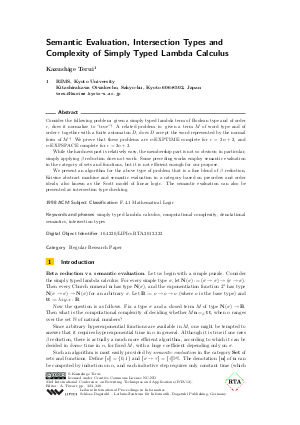Semantic Evaluation, Intersection Types and Complexity of Simply Typed Lambda Calculus
Author Kazushige Terui
-
Part of:
Volume:
23rd International Conference on Rewriting Techniques and Applications (RTA'12) (RTA 2012)
Part of: Series: Leibniz International Proceedings in Informatics (LIPIcs)
Part of: Conference: International Conference on Rewriting Techniques and Applications (RTA) - License:
 Creative Commons Attribution-NonCommercial-NoDerivs 3.0 Unported license
Creative Commons Attribution-NonCommercial-NoDerivs 3.0 Unported license
- Publication Date: 2012-05-29
File

PDF
LIPIcs.RTA.2012.323.pdf
- Filesize: 0.58 MB
- 16 pages
Document Identifiers
Subject Classification
Keywords
- simply typed lambda calculus
- computational complexity
- denotational semantics
- intersection types
Metrics
- Access Statistics
-
Total Accesses (updated on a weekly basis)
0Document
0Metadata
Abstract
Consider the following problem: given a simply typed lambda term of Boolean type and of order r, does it normalize to "true"? A related problem is: given a term M of word type and of order r together with a finite automaton D, does D accept the word represented by the normal form of M? We prove that these problems are n-EXPTIME complete for r=2n+2, and n-EXPSPACE complete for r=2n+3. While the hardness part is relatively easy, the membership part is not so obvious; in particular, simply applying beta reduction does not work. Some preceding works employ semantic evaluation in the category of sets and functions, but it is not efficient enough for our purpose. We present an algorithm for the above type of problem that is a fine blend of beta reduction, Krivine abstract machine and semantic evaluation in a category based on preorders and order ideals, also known as the Scott model of linear logic. The semantic evaluation can also be presented as intersection type checking.
Cite As Get BibTex
Kazushige Terui. Semantic Evaluation, Intersection Types and Complexity of Simply Typed Lambda Calculus. In 23rd International Conference on Rewriting Techniques and Applications (RTA'12). Leibniz International Proceedings in Informatics (LIPIcs), Volume 15, pp. 323-338, Schloss Dagstuhl – Leibniz-Zentrum für Informatik (2012)
https://doi.org/10.4230/LIPIcs.RTA.2012.323
BibTex
@InProceedings{terui:LIPIcs.RTA.2012.323,
author = {Terui, Kazushige},
title = {{Semantic Evaluation, Intersection Types and Complexity of Simply Typed Lambda Calculus}},
booktitle = {23rd International Conference on Rewriting Techniques and Applications (RTA'12)},
pages = {323--338},
series = {Leibniz International Proceedings in Informatics (LIPIcs)},
ISBN = {978-3-939897-38-5},
ISSN = {1868-8969},
year = {2012},
volume = {15},
editor = {Tiwari, Ashish},
publisher = {Schloss Dagstuhl -- Leibniz-Zentrum f{\"u}r Informatik},
address = {Dagstuhl, Germany},
URL = {https://drops.dagstuhl.de/entities/document/10.4230/LIPIcs.RTA.2012.323},
URN = {urn:nbn:de:0030-drops-35012},
doi = {10.4230/LIPIcs.RTA.2012.323},
annote = {Keywords: simply typed lambda calculus, computational complexity, denotational semantics, intersection types}
}
